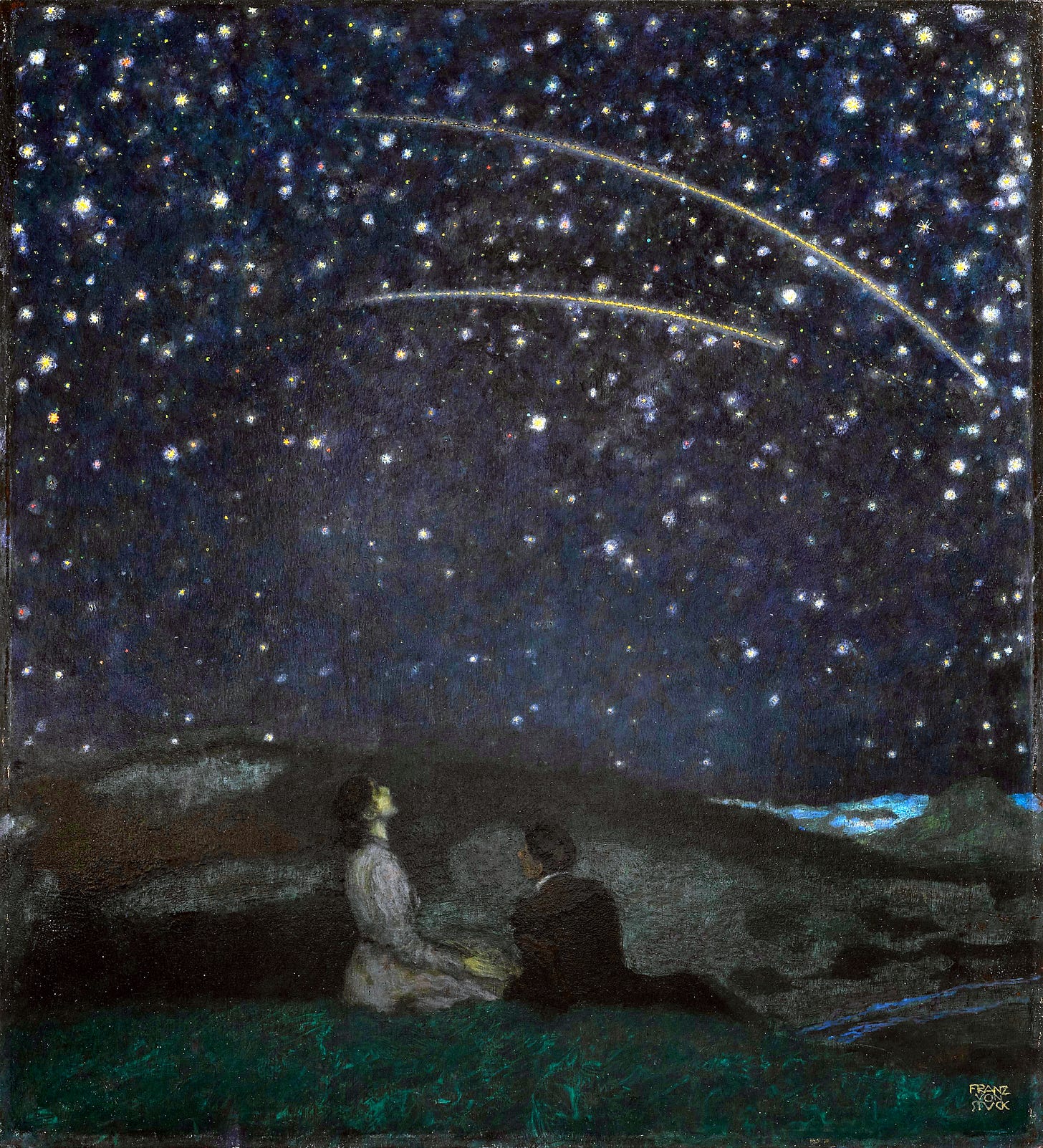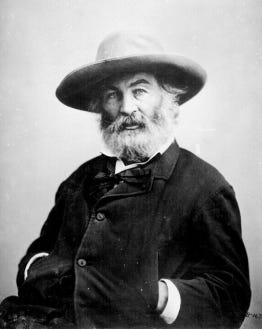
When I Heard the Learn’d Astronomer
by Walt Whitman
When I heard the learn’d astronomer, When the proofs, the figures, were ranged in columns before me, When I was shown the charts and diagrams, to add, divide, and measure them, When I sitting heard the astronomer where he lectured with much applause in the lecture-room, How soon unaccountable I became tired and sick, Till rising and gliding out I wander’d off by myself, In the mystical moist night-air, and from time to time, Look’d up in perfect silence at the stars. ═══════════════════════
The tendency of the great poets of 18th-century England to go on has been noted already in this space. Walt Whitman (1819–1892), too, indisputably does go on. He numbers among those poets from whose body of work it’s difficult to choose a poem to write about here, simply because so many of them are so long.
But even in the context of his own century and literary culture, surrounded by many poets who wrote at length, Whitman is different. Unlike Longfellow’s popular narrative poems — “The Song of Hiawatha,” for example, or “Evangeline” — which require room to unfold their stories in cast-iron meter, Whitman’s poems generally need room for their form to exert itself. That form’s chief principle, like that of the Hebrew poetry of the Bible, is repetition and restatement.
As longtime Poems Ancient and Modern readers may recall, Whitman’s “A Noiseless Patient Spider” demonstrates that he was not inattentive to the metrical conventions of English verse. Still, his lines tend to generate their poetic rhythm, urgency, and cohesion not through regular patterns of meter, but via patterns of repetition and the breaking of those patterns.
The more room the poetic voice has to go on repeating itself, the more transcendent momentum it builds as it goes. Ultimately, whatever it happens to be talking about, that voice attains prophetic proportions: the Prophet Jeremiah set down in the Middle Atlantic states and given a mandate to consider grass, mockingbirds, the funeral cortege of the assassinated Abraham Lincoln, and the self, instead of the misfortunes of Israel.

Sometimes, though, this formal principle works in a more concentrated format, as in “When I Heard the Learn’d Astronomer.” This short poem, dating from 1865 and consisting of only eight lines, devotes its first half to reiterations of the word when, in phrases that rearrange the same basic idea. Yet somehow, because of that insistent reiteration and rearrangement — amplified by the expansion of the lines from trimeter to pentameter to heptameter to a nine-stress line — those four opening lines accrue an urgency that no summary can quite communicate.
Remarkably for a poem consisting of a single octave, this repetitive four-line beginning, piling up its catalog of “proofs” and “figures,” “charts and diagrams” and algorithms, and building momentum as it goes, accomplishes exactly what the octave of a Petrarchan sonnet does. It establishes a problem — I went to a lecture, and it turned the miracle of the stars into a math lesson — which, like a sonnet’s sestet, its final four pentameter lines resolve.
Again, it’s all too easy to reach for the reductive summary with its cheap laugh. Saith the prophet: I don’t like math. I do like stars. And yet, like any effective poem, this one lands on something that is, like the stars, impossible to paraphrase without losing something of what it is. Is it profound? Not if you try to summarize it. Yet the last line, the place where the poem’s waves of repetitive intensity cast it ashore, pulses with the irreducible mystery of those stars.






Our son G was driving out of Yosemite one night after a long day of good hiking with friends. His friend R in the front seat began yelling, "What is that?!" G was equally bewildered...what was R seeing? There was nothing but night ahead on the road. "That! Those things..the lights!" Still bewildered, G stopped the car and looked closely through the windshield. "You mean the stars?" R was dumbfounded. "No way. There're so many." They all got out, drank in the skyful of stars and had a good laugh. R was so much city-raised he'd never really seen the night sky.
Through whatever flaw in myself, I simply can't enjoy Whitman. However, one thing that helped me appreciate his work anyway was when a professor pointed out that his "meter" is like the waves of the ocean (as the last line of your commentary suggests). If we all liked the same things, it would be a duller world, and I'm always glad to hear from those who like what I don't; a good reminder that beauty and excellence exist without my personal affection being needed.